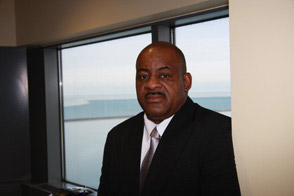
Marcus Lyons (Photo: Jennifer Linzer)
Nineteen years after he was convicted of a rape that occurred in 1987 in the Village of Woodridge west of Chicago, Marcus A. Lyons was exonerated by DNA testing that linked semen recovered from the victim’s bra and underpants to an unknown man — who subsequently was identified but not prosecuted because the statute of limitations had expired. Although the crime occurred before the dawn of the DNA forensic age, conventional ABO testing in use at the time would have prevented Lyons’s wrongful prosecution — if only the bra and underpants had been tested — but, due to Woodridge detective’s malfeasance, they weren’t.
The victim, Rebecca Auten, a 29-year-old Caucasian, reported the rape to Woodridge police at 11:20 p.m. on November 30, 1987. She said she’d been relaxing in her apartment — wearing a robe, bra, and underpants — when a man knocked on her door at around 8:30 p.m., saying he was “Mr. Williams from downstairs” and asking to borrow a plunger. When she told him she didn’t have a plunger, he asked to use her bathroom. She allowed him inside, sat down on her living room couch, and lit a cigarette. The man then forced her to disrobe and raped her.
When he left, Auten put on the robe, bra, and underpants she previously had been wearing, but took them off a little later to shower, leaving them on her bathroom floor. After the shower, she dressed, putting on clean underpants, and called a close friend who came to her apartment, where they talked until Auten called the police. After interviewing Auten, an officer photographed the garments on the bathroom floor and put them into an evidence bag, which he took to police headquarters and put into a property control locker.
Detective James Grady took Auten to a hospital in nearby Naperville, where a sexual assault kit was prepared. Grady took the kit and Auten’s underpants — the clean ones she put on after showering — to police headquarters, where they also were out into a property control locker.
Auten described the rapist as an African American between 25 and 30, standing about 5-9, weighing about 200 pounds, having a large belly and hips, and wearing brown polyester pants and a blue parka with a fur collar — which she had burned with her cigarette. From Auten’s description, police created a composite sketch both the manager of the apartment complex where the rape occurred and Auten’s next-door neighbor both told police looked like the only African American resident of the complex — Marcus Lyons.
Police went to Lyons’s apartment, which he gave them consent to search. Found brown polyester pants and a blue nylon jacket, but the pants had a 32-inch waist, too small for a 200-pound man, and the jacket had no fur collar. Lyons, a 29-year-old Navy veteran and reservist with no criminal record, denied the crime, but had no alibi.
On December 3, Detective Grady showed Auten an array of six photographs, including one of Lyons, which police obtained from AT&T Bell Laboratories, where Lyons was a computer operator. His photo showed him in a white shirt and tie, differing from the other five photos, which were police mug shots. From the array, Auten identified Lyons as the rapist. Grady then took the rape kit and underpants Auten put on after showering — but not the garments she’d left on the bathroom floor before showering — to the DuPage County Crime Laboratory for forensic analysis.
On December 4, at the request of police, Lyons stood in a live lineup with five other men at the DuPage County jail. He was the only man in the lineup whose photo Auten had seen the previous day and — although he was a trim 165 pounds, not the heavy-set man she initially described — she again identified him. Lyons agreed to take a polygraph examination, which was administered the next day, December 5, by Richard O’Brien, a private polygraph examiner in Hinsdale, Illinois.
On December 7, the DuPage County Crime Lab reported finding nothing of evidentiary significance in the rape kit or on the underpants that Detective Grady had submitted for analysis. The same day, O’Brien issued a report saying that the polygraph results indicated Lyons was deceptive when he denied the crime. On December 16, a DuPage County grand jury returned an indictment charging Lyons with two counts of criminal sexual assault and one count of unlawful restraint.
At Lyons’s trial in October 1988, the prosecution, led by Assistant State’s Attorney Joseph Birkett, introduced the post-shower underpants and rape kit results into evidence, but said nothing about the garments that had not been tested. Lyons’s defense lawyer, Thomas Freeman, was under the erroneous impression that the underpants entered into evidence were those Auten had put on after the rape and left on her bathroom floor. Both Freeman and Birkett, in fact, explicitly told the jury that. Detective Grady, who was present in the courtroom and knew that information was erroneous, did nothing to correct it. The jury found Lyons guilty on all counts and, on October 19, 1988, Judge Ronald Mehling sentenced him to six years in prison. Lyons retained a Chicago lawyer, George C. Howard Jr., to appeal the conviction, but Howard, who recently had been reprimanded by the Illinois Attorney Registration & Disciplinary Commission for neglecting another client, failed to file the appeal.
On March 15, 1991, with credit for good behavior, Lyons was released from prison. Thirteen days later, he donned his Navy uniform and went to the old DuPage County courthouse in downtown Wheaton, where he tried to crucify himself — literally — on a cross he had made from railroad ties. Just as he nailed one foot to the cross, however, the police arrived — “Come on nigger,” said one officer, “your 15 minutes of fame are over” — and forcibly removed Lyons.
In 2005, after learning that not all of the physical evidence had been tested, Lyons turned to more conventional means of pursuing justice. He retained the Waukegan law firm of Stone & Associates, which filed a motion for post-conviction DNA testing of the untested items. Joseph Birkett, who by this time in his second term as the elected state’s attorney of DuPage County, had no objection. The testing was performed in stages by the DuPage County Crime Laboratory, which reported on January 16, 2007, that semen recovered from the previously untested garments “could not have originated from Marcus Lyons.” In addition, the testing determined that if the garments had been subjected to conventional ABO testing in 1987, Lyons would have been eliminated as the source of the semen before he was indicted; the semen came from someone with Type A blood, but Lyons had Type B.
On July 27, 2007, Stone & Associates filed a petition for post-conviction relief, which Birkett did not oppose. “As far as I’m concerned,” he said, “Marcus Lyons deserves to have his record cleared.” Six weeks later, DuPage County Circuit Court Judge Robert J. Anderson vacated Lyon’s conviction and Birkett dismissed the charges the following September 18.
On December 19, 2008 — in response to a petition filed by Jane Raley, senior counsel at Northwestern University School of Law’s Center on Wrongful Convictions, and her students — Illinois Governor Rod Blagojevich granted Lyons a pardon based on innocence, qualifying him for $85,350 in compensation from the Illinois Court of Claims.
The Chicago law firm of Loevy & Loevy brought a federal lawsuit against the Village of Woodridge, Detective Grady, and others, for malicious prosecution, intentional infliction of emotional distress, and depriving him of his right to due process of law. During discovery in that case, it was disclosed that the source of the semen had been identified — Carl B. Anderson, of Bolingbrook, whose prosecution was barred by the statute of limitations but who in 1987 was 22 years old and worked at a filling station adjacent to the apartment building in which the rape occurred. On June 7, 2012, the Woodridge Village Board approved the settlement of Lyons’s federal civil rights suit for $5 million.
— Rob Warden

